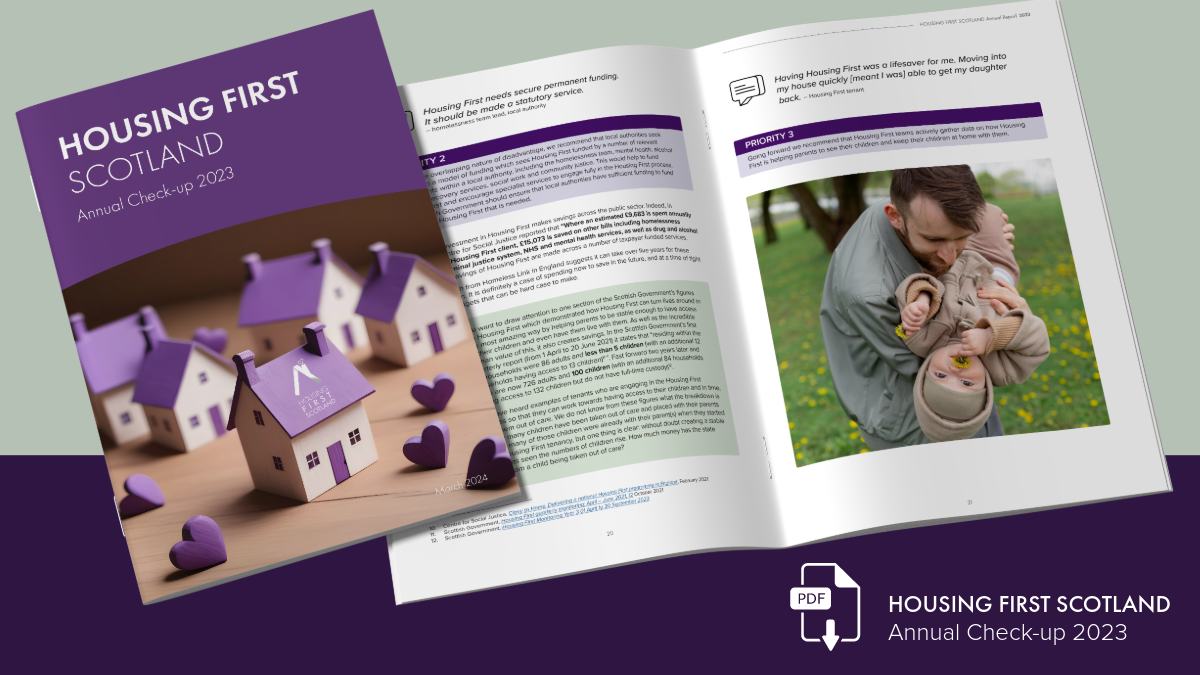Housing First Scotland annual check-up: Joint funding call to support people and families

Families are increasingly benefiting from the positive impact of Housing First Scotland, figures highlighted in a new report suggest.
The report published by Homeless Network Scotland flags up Scottish Government figures showing there are 100 children in Housing First households against fewer than five reported in 2021 – hinting at the growing scope for Housing First to reunite parents and children.
This would add to the proven life-changing effects of Housing First in preventing homelessness for people who face multiple disadvantages, by providing settled housing with flexible support.
But despite these promising figures the report warns the housing crisis and current funding arrangements are “actively damaging” delivery, upscaling and staffing of Housing First – amid rising demand and increasing homelessness.
The report states: “Housing First reaches people other services have not been able to reach. All this needs a steady supply of social homes.”
It says contributors have given examples of tenants engaging in the Housing First process so they can work towards having access to their children – and in time take them out of care – but adds that more data is needed to get the full picture of what is happening.
Housing First combines settled, ordinary housing in a community with flexible support – as much or as little as needed – to help a person maintain their tenancy.
The Check-up report sets out the successes and challenges in 2023-24 of Housing First across 26 local authorities, based on insights from housing and support providers, and tenants.
The report contains 14 priorities based on themes that came up again and again – covering areas such as funding, tenancy support, partnership working and staffing.
As of September 2023, 1,646 Housing First tenancies had been started since inception in Scotland. Housing First is demonstrating that 90% of tenancies are being sustained over 12 months from entry.
But the report points to analysis by Heriot-Watt University that suggests Housing First is currently only meeting around 9% of projected demand, underscoring the need for long-term funding.
In most local authorities, funding for Housing First is aligned with transition funding from Scottish Government which is temporary in nature.
In some areas this means local authorities are unable to offer Housing First workers job security, with knock-on effects on recruitment and caseload sizes.
The report highlights the urgent need for Housing First to move toward a more permanent cycle of funding so that it can be upscaled at pace. Due to the overlapping nature of people’s circumstances, a model of funding that reaches across a range of council departments is now needed to get best results – including homelessness, community justice, mental health, drug and alcohol recovery services.
The report also points to evidence of cost savings across the NHS and wider public sector delivered by Housing First and stresses the importance of all services that benefit investing in delivery.
Housing minister Paul McLennan said: “Providing people experiencing homelessness with accommodation first, before helping with their longer term needs, is at the heart of rapid rehousing.
“The Scottish Government’s ambition is that Housing First will be the first response for people across Scotland whose homelessness is made harder by experiences with trauma, addiction and mental health difficulties.
“I welcome this report which highlights the steady progress local authorities have made in rolling-out Housing First across Scotland, with 26 local authorities now delivering the service, over 1,600 tenancies delivered, and tenancy sustainment rates of 90%.
“It is particularly profound that enabling people to maintain settled tenancies through Housing First is supporting children to return to safe homes.
“I recognise that for Housing First to achieve its full potential, a steady supply of social homes is needed and there is more to do to ensure it is available for anyone who needs it. We remain committed to working in partnership with local authorities to achieve that ambition.”
Homeless Network Scotland chief executive Maggie Brünjes said: “Housing First in Scotland is becoming internationally regarded and our local authorities and their partners deserve huge credit for branching out Housing First in the face of housing, budget and cost-of-living crises.
“But there are thousands more people braving a range of challenges who are not getting the proven benefits of Housing First. And there are many support staff juggling complex caseloads under a shroud of job insecurity.
“This can be solved by giving more homes to Housing First and by drawing funding from across local authority budgets to mirror the range of life circumstances that Housing First meets. We can’t risk rolling back on Housing First. We need national and local leadership to help step up our efforts to extend the positive impact of Housing First to more people, families and communities.”









